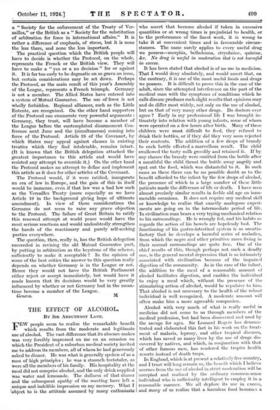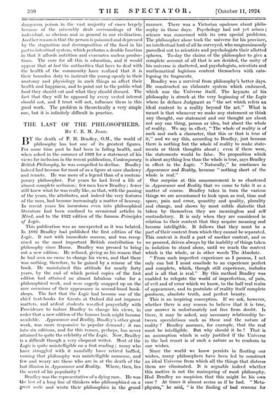THE EFFECT OF ALCOHOL.
BY STE ARBUTHNOT LANE.
F" people seem to realize the remarkable benefit which results from the moderate and legitimate use of aleohol. The vast difference that its absence makes was very forcibly impressed on me on an occasion on which the President of a suburban medical society invited me to address its members, all of whom he had -generously asked to dinner. He was what is generally spoken of as a man of high principles ; he was a staunch teetotaler, as were all the members of his family. His hospitality at the meal did not comprise alcohol, and the only drink supplied ins water and lemonade. The dullness of that dinner an. d the subsequent apathy of the meeting have left a ,unique and indelible impression on my memory. What I !object to is the attitude assumed by many enthusiasts' who assert that because alcohol if taken in excessive quantities or at wrong times is prejudicial to health, or to the performance of the finest work, it is wrong to take it at convenient times and in favourable circum- stances. The same surely applies to every useful drug we possess—morphia, belladonna, strychnine, quinine, &c. No drug is useful in moderation that is net harmful in excess.
It has been stated that alcohol is of no use in medicine.. That I would deny absolutely, and would assert that, on the contrary, it is one of the most useful foods and drugs we possess. It is difficult to prove this in the case of the adult, since the attempted interference on the part of the medical man with the symptoms of conditions which he calls disease produces such slight results that opinions may and do differ most widely, not only on the use of alcohol, but on that of very many other drugs. Do doctors ever agree ? Early in my professional life I was brought in- timately into relation with young infants, some of whom were operated on a few hours after birth. Many of these children were most difficult to feed, they refused to drink their bottles, or if they did they very soon rejected their contents. The addition of a few drops of brandy to each bottle effected a marvellous result. The child swallowed the tasty milk greedily and retained it. If by any chance the brandy were omitted from the bottle after a mouthful the child thrust the bottle away angrily and spat out the food, which was distasteful to it. In such cases as these there can be no possible doubt as to the benefit afforded to the infant by the few drops of alcohol, the presence of which in a large number of these little patients made the difference of life or death. I have seen almost precisely similar results in feeble old age on innu- merable occasions. It does not require any medical skill or knowledge to realize that exactly analogous experi- ments are going on in the intermediate period of life. In civilization man bears a very trying mechanical relation to his surroundings. Re is wrongly fed, and his habits as regards the action of his bowels are hopelessly bad. The functioning of his gastro-intestinal system is so unsatis- factory that he develops a harmful series of maladies, from which the negro and other primitive races living in their normal surroundings are quite free. One of the chief results of this, though perhaps not such a deadly one, is the general mental depression that is so intimately associated with civilization because of the impaired digestion of the community. As in the case of the infant, the addition to the meal of a reasonable amount of alcohol facilitates digestion, and enables the individual to enjoy a meal which, without the presence of the stimulating action of alcohol, would be repulsive to him. That alcohol is not necessary to the health of the robust individual is well recognized. A moderate amount will often make him a more agreeable companion.
Alcohol with very much of what is really useful is medicine did not come to us through members of the medical profession, but had been discovered and used by the savage for ages. Sir Leonard Rogers has demons- trated and elaborated this fact in his work on the treat- ment of malaria, leprosy, and other tropical diseases, which has saved so many lives by the use of drugs dis- covered by natives, and which, in conjunction with that of other famous men, has rendered the tropics health resorts instead of death traps.
In England, which is at present a relatively free country, and I trust will long remain so, the benefit which I believe acertres from the use of alcohol in strict moderation will be accepted and realized by the ordinary common-sense individual who is sufficiently intelligent to employ it in a reasonable manner. We all deplore its use in excess, and many of us realize that a harmless food becomes a dangerous poison in the vast majority of cases largely because of the miserably drab surroundings of the individual, so obvious and so general in our civilization. Another reason is that the person is poisoned and depressed by the stagnation and decomposition of the food in his gastro-intestinal system, which performs a double function in that it affords nutrition and evacuates useless produc- tions. The cure for all this is education, and it would appear that at last the authorities that have to deal with the health of the community have realized that it is their bounden duty to instruct the young openly in their anatomy and physiology in such things as affect their health and happiness, and to point out to the public what food they should eat and what they should discard. The fact that they will be opposed by every vested interest should not, and I trust will not, influence them in this good work. The problem is theoretically a very simple one, but it is infinitely difficult in practice.











































 Previous page
Previous page